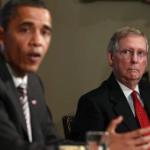Whatever Happened to the Loyal Opposition?
 In 2010 as in 2008, voters asked parties to move to the center. Instead they have gotten more partisanship, less civil discourse and fewer results.
In 2010 as in 2008, voters asked parties to move to the center. Instead they have gotten more partisanship, less civil discourse and fewer results.
Although results in a handful of contests around the country are still being sorted out, the 2010 midterm elections are---thankfully---pretty much behind us. It was an all-around ugly campaign season, and for Democrats it culminated in an even uglier election night.
President Obama was correct when he acknowledged in his post-election press conference that Democrats took a “shellacking” on November 2. I do not believe, however, that his explanation of our party’s defeat was entirely correct, and surviving Democrats on Capitol Hill are similarly mistaken as they rationalize the election outcome. As in most divorces, a failure to communicate may have contributed to the rift between Democratic office holders and the American electorate, but it is not close to being the complete explanation. More words---even better wording---would not have turned things around.
The day after the election I met with a group of students visiting Washington, DC from the United Kingdom. They wanted to know why things turned out as they did. My answer, summarized here, was as follows:
- There is no getting around the fact that the vote was an expression of voters’ displeasure with the health and direction of the country.
- While I think that the voters’ assessment was overly harsh and perhaps even unfair, that means absolutely nothing in a democracy. Gordon Brown and his Labour Party learned the same thing in the UK last spring;
- But in neither the UK nor the U.S. were the results surprising. An intense anti-status quo sentiment had been at work in both countries for a long time before voters went to the polls.
- The dramatic reversal of 2010 began the night of the 2008 elections, as Democrats and most of the punditry class predictably misinterpreted that year’s victories. The 2008 election represented a negative verdict on George W. Bush and the performance of his administration. The 2008 results also constituted a directive from the voters to conduct the public’s business differently, and to move policies to the center. The results were not a mandate to move to the left. And contrary to what some may think, Democrats didn’t lose this year because they weren’t liberal enough!
If the 2008 election results were misunderstood, there is already plenty of evidence to suggest that the 2010 results are also being misinterpreted. As I told our young British friends, I do not believe this November’s vote was a mandate to veer to the far right. Neither should the outcome be viewed as an endorsement of further political gamesmanship and partisan stalemate. This year the voters said to the nation’s political leadership---once again---“Get your act together and deal with the problems of the country straight up. Don’t screw around!”
Left unsaid was the message, “And if you don’t listen this time, we’ll make another change in 2012!”
That’s just my opinion, and it is no surprise that it is not shared by others, most especially victorious Republicans and their allies. I think Republicans may well be as misguided today as the Democrats were two years ago. As a result, we are likely to experience more partisanship and less civil discourse, more gridlock and less governing, more vitriol and fewer results. The more partisan elements on the right will seek to use the levers of Congressional power to further undermine and delegitimize the Obama presidency. And so far at least, there is little reason to think that GOP leaders will try to rise above the fury of their most rabid followers and curb such excesses.
Sadly---and it pains me to say this---it may no longer be accurate to refer to the party out of power as the “loyal opposition”, for there seems to be little true and overriding loyalty in evidence. This troubling new reality in American politics first became obvious during Bill Clinton’s term in office, but it is also true that Democrats often behaved just as poorly---and talked just as crazily---when George W. Bush was President. Yet as bad as things sometimes got during those two presidencies, the situation has become exponentially worse during Barack Obama’s first two years in the Oval Office. Much of the anti-Obama rhetoric ranges from viciously hostile to completely irrational.
When Senate Republican leader Mitch McConnell states that his first priority is to make Obama a one term President he is simply acknowledging what has been apparent since January 21, 2009: Republicans appear willing to have the country fail if that is what it takes to defeat this Democratic President. Such an attitude is shameful and destructive, and it represents yet another blow against representative self-government.
To compound the problem, I fear that many in my party are inclined to respond in kind. Ultimately there will be no winners, only losers---most especially those who will inherit the mess this generation of politicians, their handlers and their most ardent supporters are creating.